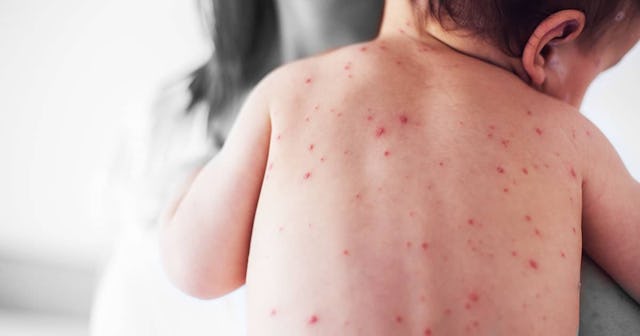Measles Can Cause 'Immune System Amnesia'

Most of us are aware of the complications of measles: high fever, bronchitis, encephalitis (brain swelling), pneumonia, and even death. And so we vaccinate our kids accordingly, to protect them and their neighbors from the dangers of the virus.
Still, others are quick to dismiss the risks of measles as overblown, and choose to forgo vaccination because of numerous (unfounded) fears about the shot. In fact, in the past few years, frightening measles outbreaks have been cropping up all over the country, with experts blaming unvaccinated folks for the upticks.
The thing is, whatever you may think about vaccination, measles is a serious illness—it’s not the same as a bad cold or an annoying rash. According to the CDC, before widespread vaccination in the U.S., 48,000 people were hospitalized each year with measles complications, and about 500 people died yearly from the virus.
This is serious stuff, and if all that isn’t scary enough, it turns out measles has another quality that makes it dangerous AF. According to two new studies—one published in Science, and the other in Science Immunology—measles doesn’t just have the potential to make you very sick, but it can also deplete your ability to combat other viruses in the future.
It’s a phenomenon that doctors are calling “immune system amnesia,” and the idea is that the virus basically wipes out much of the immunity you’ve previously gained, killing antibodies you’ve built up to other scary diseases like pneumonia and the flu.
And these effects can last for YEARS, according to researchers.
This is freaking terrifying, especially if you are the parent of young children. Kids are especially vulnerable to viruses like the measles—and they also have less mature immune systems than the rest of us.
If you have little kids, you are aware of how often they get sick. When my kids were little, it seemed like they caught some bug or other at least once a month, sometimes more. It made sense—their immune systems weren’t fully developed yet, and as much as I hated watching them catch every single virus making its way through my community, I consoled myself with the knowledge that they were strengthening their immune systems.
But if they were to get the measles, all bets would be off.
Thankfully, my kids received their measles vaccinations on schedule. According to the CDC, two doses of measles are 97% effective against the measles. Phew.
It’s hard to understand why anyone would not want to offer this protection to their children, especially considering the fact that complications of measles are not mild—and in fact, can cause long-term immune damage, leaving your child more vulnerable to a host of other dangerous childhood illnesses.
Aditya Romansa/Unsplash
“When parents say no to getting a measles vaccine, you’re not just taking a risk of your kid getting measles, you’re causing them to lose this amazing resource of defenses they’ve built up over the years before measles, and that puts them at risk of catching other infections,” Dr. Michael Mina, lead author of the study published in Science, told the New York Times.
“You’ve got to watch your kid’s back for a few more years,” Dr. Mina added.
The study led by Dr. Mina looked at 77 unvaccinated kids from the Netherlands during a 2013 measles outbreak. Researchers drew blood from the kids before and after they became sick with the measles using VirScan, a tool that measures antibodies levels in blood. They also looked at the bloodwork of children who had not become sick with the virus, comparing both groups.
The researchers found that kids who had gotten the measles had a 11-73% reduction in antibodies, the average loss being about 40%.
JFC, that is absolutely terrifying.
In the other study, published in Science Immunology, researchers studying the same group of children found that measles wiped out these kids’ immune memory B cells. According to Vox, this basically meant that the kids’ immune systems regressed “to an immature, baby-like state.”
“The studies show that measles is more dangerous than we think and can have consequences on our immune system long after the symptoms of measles are gone,” Velislava Petrova, lead author of the Science Immunology paper, told Vox.
Petrova’s main takeaway from her research? Get the damn shot.
Vaccination, according to Petrova, “is important not only to prevent you from measles disease, but also from other secondary infections you can have if you get measles and have your immune system damaged.”
It makes no sense to take that risk, if you ask me. As a parent, why would you take the risk of your child catching a virus that could make them seriously ill, potentially kill them, and possibly wipe out their immune system so that fighting any other serious illnesses in the future becomes much more difficult?
Measles is even worse than we thought, folks. Yet vaccination is a very effective way to protect your children, yourself, and everyone in your community from its devastating effects. Vaccinate, please. There is no good excuse not to.
This article was originally published on